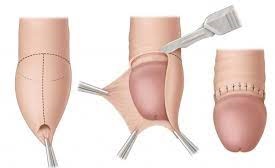Circumcision
Overview
Circumcision is a surgical procedure that involves the removal of the foreskin covering the glans (head) of the penis. At Indotaj Medical Center in Tajikistan, we offer circumcision services for various reasons, including religious, medical, and cultural considerations.
It is common for baby boys to undergo circumcision, typically within the first week of life. This procedure has historical roots as a religious rite and continues to be performed for a range of cultural and medical reasons. While circumcision is more commonly associated with infants, adults may also choose to undergo the procedure, although this is less frequent.
At Indotaj Medical Center, our experienced healthcare professionals provide safe and compassionate care for individuals seeking circumcision services, ensuring that each patient’s unique needs and cultural considerations are respected.

Why it's done
- Circumcision has deep-rooted religious significance for certain communities. In Judaism, it is a covenant with God, and in Islam, it is considered a religious duty.
- Circumcision may reduce the risk of certain infections, including urinary tract infections (UTIs) and sexually transmitted infections (STIs).
- Some argue that circumcision makes it easier to maintain genital hygiene, as the removal of the foreskin reduces the potential for the accumulation of smegma (a mixture of dead skin cells and other bodily fluids).
- Circumcision is practiced as a cultural or social norm in various communities. It may be seen as a rite of passage or a symbol of cultural identity.
- Circumcision has been associated with a decreased risk of penile cancer, prostate cancer, and cervical cancer in female partners of circumcised men. However, the evidence on these associations is not universally agreed upon, and the medical community may have varying perspectives.
- Some individuals or families choose circumcision based on personal preferences, family traditions, or aesthetic reasons.
Risk
- Bleeding.
- Infection.
- Reaction to anesthesia.
- Pain.
- Cutting the foreskin too long or too short.
- Irritation on the tip of the penis.
- Meatitis (inflamed opening of the penis).
How do I get ready for Circumcision treatment?
- Schedule a consultation with your healthcare provider to discuss the procedure, its benefits, potential risks, and any questions or concerns you may have.
- Undergo a thorough medical examination to ensure you are in good health and that there are no underlying conditions that might complicate the procedure.
- Clearly communicate your expectations and reasons for undergoing circumcision with your healthcare provider to ensure that they understand your preferences.
- Read and understand the informed consent document provided by your healthcare provider. This document outlines the details of the procedure, potential risks, and alternatives.
- Follow any fasting instructions provided by your healthcare provider. In some cases, you may be asked to refrain from eating or drinking for a specific period before the procedure.
- Maintain good personal hygiene before the procedure. Shower or bathe on the day of the surgery to reduce the risk of infection.
- Wear loose-fitting and comfortable clothing on the day of the procedure. This will help prevent irritation and allow for easier dressing and undressing.
- Since you may experience some discomfort after the procedure, arrange for someone to drive you home after the appointment.


